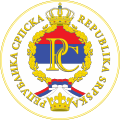
Alija Izetbegović was a Bosnian politician, lawyer, Islamic philosopher and author, who in 1992 became the first president of the Presidency of the newly independent Republic of Bosnia and Herzegovina.

Republika Srpska is one of the two entities of Bosnia and Herzegovina, the other being the Federation of Bosnia and Herzegovina. It is located in the north and east of the country. Its largest city and administrative centre is Banja Luka, lying on the Vrbas river, and with a population of about 138,963 people.

The Republika Srpska was a self-proclaimed statelet in Southeastern Europe under the control of the Army of Republika Srpska during the Bosnian War. It claimed to be a sovereign state, though this claim was only partially recognized by the Bosnian government in the Geneva agreement, the United Nations, and Yugoslavia. For the first six months of its existence, it was known as the Serbian Republic of Bosnia and Herzegovina.
Four major international peace plans were proposed before and during the Bosnian War by European Community (EC) and United Nations (UN) diplomats before the conflict was settled by the Dayton Agreement in 1995.

An independence referendum was held in Montenegro on 21 May 2006. It was approved by 55.5% of voters, narrowly passing the 55% threshold. By 23 May preliminary referendum results were recognized by all five permanent members of the United Nations Security Council, suggesting widespread international recognition if Montenegro were to become formally independent. On 31 May the referendum commission officially confirmed the results of the referendum, verifying that 55.5% of the population of Montenegrin voters had voted in favor of independence. Because voters met the controversial threshold requirement of 55% approval, the referendum was incorporated into a declaration of independence during a special parliamentary session on 31 May. The Assembly of the Republic of Montenegro made a formal Declaration of Independence on Saturday 3 June.

Milorad Dodik is a Bosnian Serb politician serving as the 8th president of Republika Srpska since 2022. Previously, he served as the 7th Serb member of the Presidency of Bosnia and Herzegovina from 2018 to 2022.

The Alliance of Independent Social Democrats is a Serb political party in Bosnia and Herzegovina. Founded in 1996, it is the governing party in Republika Srpska, with its leader, Milorad Dodik, serving as the current president of Republika Srpska. The party's vice-president, Željka Cvijanović, is the current member of the Presidency of Bosnia and Herzegovina, while SNSD member Radovan Višković is the current prime minister of Republika Srpska.

The Republic of Bosnia and Herzegovina was a state in Southeastern Europe, existing from 1992 to 1995. It is the direct legal predecessor to the modern-day state of Bosnia and Herzegovina.

The Croatian Republic of Herzeg-Bosnia was an unrecognized geopolitical entity and quasi-state in Bosnia and Herzegovina. It was proclaimed on 18 November 1991 under the name Croatian Community of Herzeg-Bosnia as a "political, cultural, economic and territorial whole" in the territory of Bosnia and Herzegovina, and abolished on 14 August 1996.
This article is about the politics of the Republika Srpska, one of the two entities that together comprise the state of Bosnia and Herzegovina, the other being the Federation of Bosnia and Herzegovina.

On 17 February 2008, the majority of members of the Assembly of Kosovo, including Hashim Thaçi, and Fatmir Sejdiu, not acting in the capacity of PISG, declared Kosovo an independent and sovereign state. Kosovo was soon recognized as a sovereign state by the United States, Turkey, Albania, Austria, Germany, Italy, France, the United Kingdom, the Republic of China (Taiwan), and others. This triggered an international debate over whether Kosovo's unilateral declaration of independence had set a precedent in international law that could apply to other separatist movements, or whether it is a special case. The recognition of Kosovo's independence by 101 out of 193 UN states, according to many sources, has given fresh impetus to other separatist movements.

General elections were held in Bosnia and Herzegovina on 3 October 2010. They decided the makeup of Bosnia and Herzegovina's Presidency as well as national, entity, and cantonal governments.
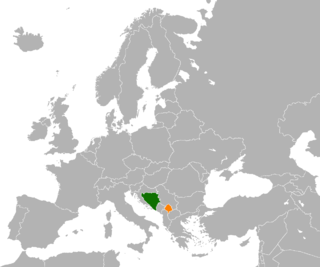
The relations of Bosnia and Herzegovina and Kosovo are unofficial because Bosnia and Herzegovina's central government has not recognized Kosovo as an independent state, essentially through the veto of the Bosnian Serb-dominated Republika Srpska. Bosniak and Croat members of the Presidency want to recognise Kosovo, but Serb members refuse. Bosnia and Herzegovina's constitution requires consensus among all three members in order to perform such an action. Bosnia-Herzegovina remains the only country of the former Yugoslavia that does not recognize Kosovo's independence.
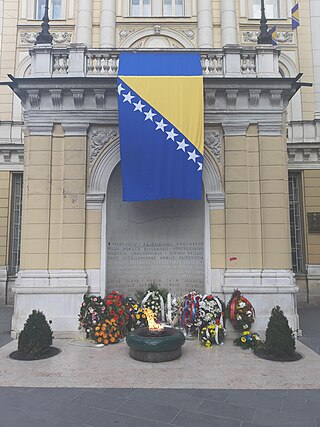
Independence Day is a public holiday observed in Federation of Bosnia and Herzegovina held on 1 March to celebrate the independence of the then Republic of Bosnia and Herzegovina from the Socialist Federal Republic of Yugoslavia in 1992. It is not observed in Republika Srpska, the other political entity of Bosnia and Herzegovina.

Republika Srpska–Serbia relations are the foreign relations between Republika Srpska, one of the two entities in Bosnia and Herzegovina, and Serbia. Republika Srpska has an office of representation in Belgrade and Serbia has a consulate-general in Banja Luka. Serbia and Republika Srpska have signed an Agreement on Special Parallel Relations.
The partition of Bosnia and Herzegovina was discussed and attempted during the 20th century. The issue came to prominence during the Bosnian War, which also involved Bosnia and Herzegovina's largest neighbors, Croatia and Serbia. As of 2023, the country remains one state while internal political divisions of Bosnia and Herzegovina based on the 1995 Dayton Agreement remain in place.
Several referendums have been held in Republika Srpska during its existence, whilst others have been proposed but not happened.
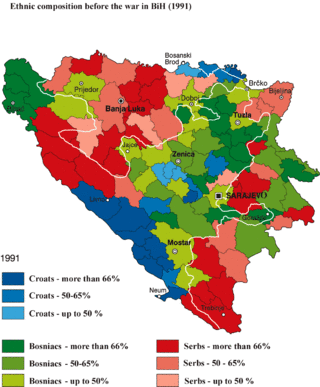
A Bosniak republic, or Bosniak entity, was proposed during the Bosnian War when plans for the partition of Bosnia and Herzegovina were made. It would either be established as one of three ethnic states in a loose confederation, or as an independent "Bosniak state" in the area controlled by the Bosnian Army, as unofficially proposed by some Bosniak leaders. Thus, the Bosniak-inhabited territories or Bosnian Army-controlled area would become a Bosniak state, as Republika Srpska was for the Bosnian Serbs and Herzeg-Bosnia for the Bosnian Croats. The failed 1992 Serb–Croat Graz agreement would see a small Bosniak buffer state, pejoratively called "Alija's Pashaluk" on a map displayed during the discussions. The Owen-Stoltenberg plan would give Bosniaks 30% of territory, including ca. 65% of the Bosniak population .The Dayton Agreement ended the war and created the federal republic of Bosnia and Herzegovina (BiH), made up of two entities, the Bosniak and Croat-inhabited Federation of Bosnia and Herzegovina (FBiH), and the Serb-inhabited Republika Srpska (RS). As noted by international relations expert Niels van Willigen: "Whereas the Bosnian Croats and Bosnian Serbs could identify themselves with Croatia or Serbia respectively, the absence of a Bosniak state made the Bosniaks firmly committed to Bosnia as a single political entity."

A referendum on the National Day of Republika Srpska, called the Day of Republika Srpska was held on 25 September 2016. The Constitutional Court of Bosnia and Herzegovina had on 26 November 2015 ruled against the constitutionality of the holiday, deeming it discriminatory against non-Serbs in the entity. The Day of Republika Srpska falls on 9 January, which is both an Orthodox feast day and the date when the Bosnian Serb republic was declared in 1992 although Serbian Orthodox Church venerates saints on each day in a year. The result was 99.8% in favour of keeping the date.
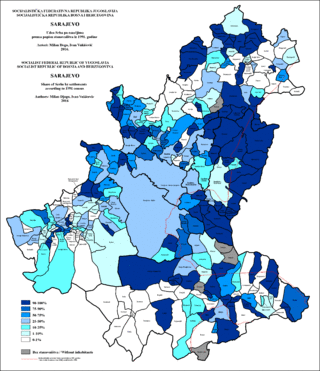
The Exodus of Sarajevo Serbs was the migration of ethnic Serbs from Sarajevo, the capital of Bosnia and Herzegovina, between January and March 1996 after the Dayton Agreement that concluded the Bosnian War (1992–95).



![Banja Luka protest against Kosovo's declaration of independence, 27 March 2008. The banner reads, "The people say 'Yes, Kosovo is Serbia. And let [Republika] Srpska become independent'". Protesti u BL4.jpg](http://upload.wikimedia.org/wikipedia/commons/thumb/b/be/Protesti_u_BL4.jpg/220px-Protesti_u_BL4.jpg)

















